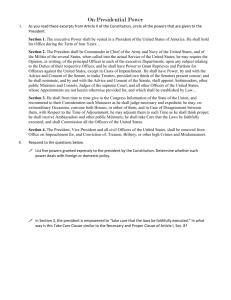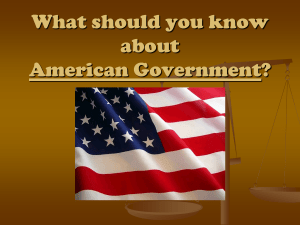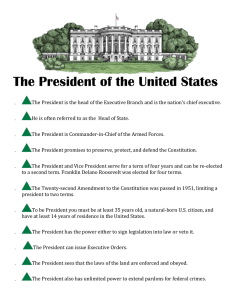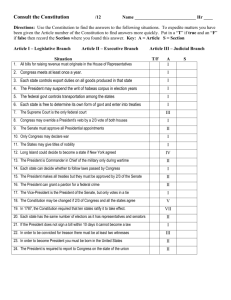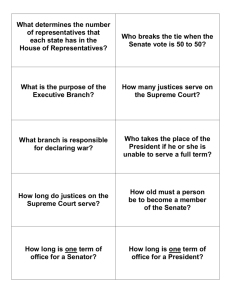Ordinance Power
advertisement
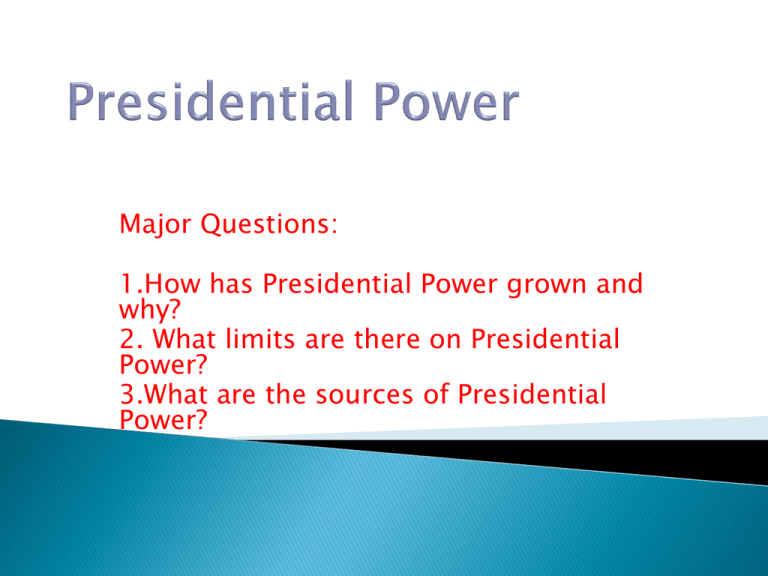
Major Questions: 1.How has Presidential Power grown and why? 2. What limits are there on Presidential Power? 3.What are the sources of Presidential Power? Section 2 Executive Powers The nature of the presidency depends on how each President views the office and exercises its powers. Three Presidential theories • Stewardship • Narrow, or Literal • Prerogative, which is similar to Stewardship "The stewardship theory of presidential power calls for a strong, assertive presidential role that in the words of Theodore Roosevelt directs the president "to do anything that the needs of the Nation demanded unless such action was forbidden by the Constitution or by the laws." If it is not forbidden, it is okay to do it. The true view of the Executive functions is, as I conceive it, that the President can exercise no power which cannot be fairly and reasonably traced to some specific grant of power or justly implied and included within such express grant as proper and necessary to its exercise. Such specific grant must be either in the Federal Constitution or in an act of Congress passed in pursuance thereof. There is no undefined residuum of power…. The grants of Executive power are necessarily in general terms in order not to embarrass the Executive within the field of action plainly marked for him, but his jurisdiction must be justified and vindicated by affirmative constitutional or statutory provision, or it does not exist. [Source: Our Chief Magistrate and His Powers (NY: Columbia University Press, 1916).] I have never understood that the presidency conferred upon me an unrestricted right to act…. I did understand, however, that my oath to preserve the Constitution to the best of my ability imposed upon me the duty of preserving, by every indispensable means, that government—that nation, of which the Constitution was the organic law. Was it possible to lose the nation and yet preserve the Constitution?… I felt that measures otherwise unconstitutional might become lawful by becoming indispensable to the preservation of the Constitution through the preservation of the nation. Right or wrong, I assume this ground, and now avow it. I could not feel that, to the best of my ability, I had even tried to preserve the Constitution if… I should permit the wreck of the government, country and Constitution altogether…. I claim not to have controlled events, but confess plainly that events have controlled me. [Source: letter from Lincoln to A. G. Hodges, 4 April 1864.] 3 Parts: Executive Orders Signing Statements Proclamations Use: To execute the law and to respond to emergencies Definition: A presidential policy directive that implements or interprets a federal statute, a constitutional provision, or a treaty. Does not need the approval of Congress Definition: A signing statement is a written pronouncement issued by the President of the United States upon the signing or veto of a bill. Use: 3 types: Constitutional: asserts that the law is constitutionally defective in order to guide executive agencies in limiting its implementation; Political: defines vague terms in the law to guide executive agencies in its implementation as written; Rhetorical: uses the signing of the bill to mobilize political constituencies. In recent usage, the phrase "signing statement" has referred mostly to statements relating to constitutional matters that direct executive agencies to apply the law according to the president's interpretation of the Constitution. Definition: the president's official announcement that the president is taking a particular action. May have the force of law. Executive orders are generally directed at people inside government, Proclamations are announcements to the world. May be Ceremonial or Substantive Substantive: George Washington- Declaration of Neutrality 1793 Abraham Lincoln-Emancipation Proclamation 1863 Ceremonial: Barack Obama- 100th Anniversary of the Birth of Rosa Parks February 1, 2013 With Senate consent, the President names most of the top-ranking officers of the Federal Government, including: (1) ambassadors and other diplomats; (2) Cabinet members and their top aides; (3) the heads of such independent agencies as the EPA and NASA; (4) all federal judges, attorneys, and U.S. marshals; (5) all officers in the armed forces. John Kerry, Secretary of State Chuck Hagel, Secretary of Defense (pending Senate Approval) Recess Appointments • Originally for vacancies that occurred during a recess….Presidential Precedent/Practice - any vacancy. • Appointee may serve only until the end of the current session of congress…must then be confirmed by new congress. During the Bush and Obama Presidencies, the Senate has attempted to block many recess appointments, leading to many offices going unfilled. In addition, a ruling that called into question nearly two centuries of presidential “recess” appointments that bypass the Senate confirmation process, a federal appeals court ruled on Friday that President Obama violated the Constitution when he installed three officials on the National Labor Relations Board a year ago. http://www.nytimes.com/2013/01/26/business/ court-rejects-recess-appointments-to-laborboard.html The Historical Debate • Debate ensued in the First Congress as to whether the President could remove appointees without the consent of the Senate. • The view that the President may remove the officials he appoints without Senate consent has prevailed over time. • In general, the President may remove any appointees except federal judges. 1926 - Myers v. United States: President may remove most federal officials as part of his appointment powers The power to appoint is the power to remove. 1935- Humphrey’s Executor v. United States Refines Myers decision: Some Federal officials can only be removed for good cause. These officials belong to certain independent agencies and need some immunity to do their jobs. • What is Executive Privilege? • What is the rationale behind it? • Should it be allowed? The privilege, claimed by the president for the executive branch of the US government, of withholding information in the public interest. This presidential power is controversial because it is nowhere mentioned in the U.S. Constitution. Pro: Presidents and their staffs have secrecy needs These decision makers must be able to deliberate in private without fear that every utterance may be made public. Con: Do Presidents have the right to withhold documents and testimony in the face of congressional investigations or judicial proceedings? All presidents going back to George Washington have exercised some form of what we today call executive privilege. The first use of this authority occurred in 1792, when Congress demanded from the Washington administration information regarding the failure of a U.S. military expedition. Washington and his Cabinet stated that they had the ability to withhold information if they felt it was in the public interest. United States v. Nixon (1974) Nixon claimed executive privilege to prevent release of White House tapes that contained incriminating evidence of his participation in a cover-up of illegal activity by administration officials. Nixon claimed that concealing the tapes was required to protect the national security. The Supreme Court ruled against the president. Nixon was trying to protect himself from incriminating information rather than promoting the public interest. What kind of crimes may be pardoned by the President? What are two examples of notable Presidential Pardons? How often does a President issue a Pardon? The president is given the power under the Constitution to "grant reprieves and pardons for offenses against the United States, except in cases of impeachment." Two types: full pardon to a person accused or convicted of a federal crime, releasing the person from any punishment and restoring her or his Civil Rights. conditional pardons that forgive the convicted person in part, reduce a penalty a specified number of years, or alter a penalty with conditions. Exceptions: Usually a private transaction between the president and an individual. In 1977 President Jimmy carter granted an Amnesty that was, in effect, a blanket pardon to those who were either deserters or draft evaders during the Vietnam War. (Jimmy Carter, Proclamation 4483, 1977) Controversy: President Nixon was granted a full and unconditional pardon for any crimes he might have committed against the United States while President. (Gerald Ford, Proclamation 4311, September, 1974) President Obama has pardoned only 22 people, fewer than any president since the modern era of pardons began in 1900. He has granted a pardon for 1 out of every 50 applicants, compared with 1 out of 33 for George W. Bush, 1 of 8 for Bill Clinton and 1 of 3 for Ronald Reagan. Source: US Department of Justice Section 3 Diplomatic and Military Powers
